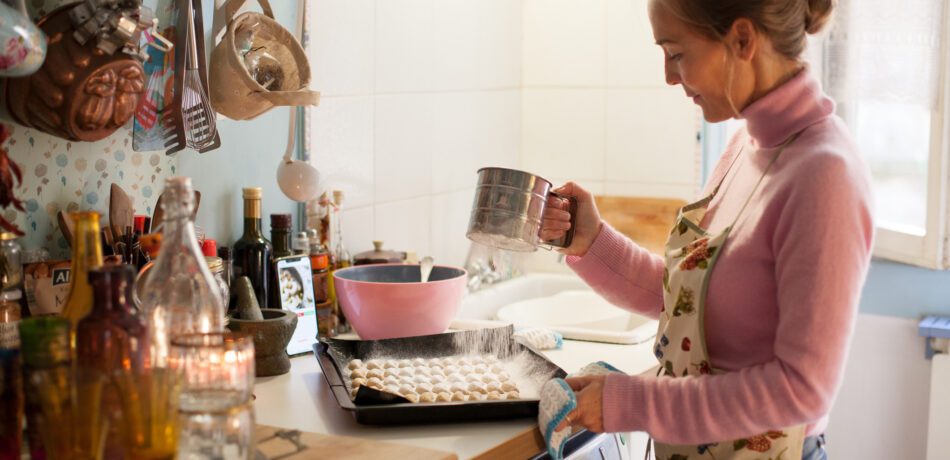Having a hobby is one of life’s joys. Whether you’ve had a hobby for a lifetime or took one up during the pandemic, many people wonder if their passion can turn into a money-making side gig or even a full-time job.
The answer is yes and we’ll feature two people who did just that and offer tips for how you can do the same!
From Home Baking Enthusiast to Professional Baker
Liz Berman is the owner of The Sleepy Baker in Natick, Massachusetts and is living proof that yes, you can turn a hobby into a thriving business.
When Liz was growing up, her mom always made her birthday cakes instead of buying them from a store so when Liz’s own son was approaching his first birthday she says, “there was no question that I was going to make his cake…not only did I love the process of baking (I am an engineer’s daughter so I find comfort in the precision of baking), but I loved being able to create something pretty (and hopefully yummy) for someone I loved.” This slowly evolved over the years to people noticing the cakes Liz made for her kids and a friend asked her to make a cake for her daughter’s birthday. That’s when Liz realized she may be able to make this a business.
Liz was still working a full-time corporate job and was slowly building her cake business mostly through social media. She chose the name of her baking business because she was baking late into the night while commuting to a full-time job and managing raising a family so naturally, she realized that she was quite literally a sleepy baker! People started to notice the cakes on social media and she reached 1,000 followers. There was a big organizational shift at her corporate job and she thought maybe it was the right time to make the jump to her baking business full time.
Within the first month of being a full-time baker she built her website, listed her business online, reviewed her pricing model, fine-tuned her menu and almost overnight, the business exploded. She shares, “I started getting orders from people outside of my immediate circle. People started to review my business which meant my business came up high on a Google search. Two weeks after I went full time, I got a call from a business in New York asking me to make and deliver a cake to one of their employees who lived locally to me. It was my first corporate order and the first indicator that people were finding out about my business online. I couldn’t believe it!”
Valuable Lessons from Liz’s Journey
Liz’s journey wasn’t all smooth sailing, it had its challenges. Here are some key lessons she learned along the way:
- Require Deposits: Liz initially hesitated to ask for deposits, but a customer no-show incident taught her the importance of securing a deposit upfront. This practice helps protect your time and effort.
- Price Your Work Thoughtfully: Pricing can be tricky in a creative business like baking where ingredient costs are always rising. Liz learned that undercharging to build a customer base wasn’t sustainable. Over time, she gained the confidence to charge fair prices for her work, “It took some time and guts for me to accept that if a customer doesn’t want to pay the price I’m quoting, they may not be the right customer for me.”
- Build a Thick Skin…A Negative Can Become a Positive: Despite being in her business for 17 years, occasionally you’ll have an unhappy customer. Liz shares, “Of course I strive to make every one of my customers happy, but I know that’s not possible. In my early days, unhappy customers would have me in tears, unable to shake it for hours. Over time, I learned that each unhappy customer is an opportunity for me to improve my business or how I communicate with my customers. A perfect example of this is when I noticed a trend in negative feedback about one particular flavor I was offering. Rather than becoming paralyzed by this news, I researched, tested and hosted a tasting party during which my guests voted on their favorite recipe. Based on their votes, I changed the recipe I used and haven’t had a complaint about it since!”
The Sleepy Baker continues to thrive and provide a source of income for Liz’s family, “I am constantly struggling to find a balance between my work and my life, a problem I think most small business owners face. I am looking ahead over the next five years and trying to figure out the direction I’ll take (open a storefront? Start offering classes?). I haven’t quite figured it out yet, but for now, I’ll just keep doing what I’m doing!”
Guaranteed Acceptance Life Insurance
Coverage options starting at $9.95 a month!
Guaranteed acceptance life insurance without medical exams, health questions, or rate increases.
A Jump from an Advertising Career to Professional Photographer
Edward Feather, of Concord, Massachusetts is owner of Edward Feather Photography. Edward had a successful career in the advertising and marketing arena for many years but his true love was photography which was deeply ingrained from a young age, inspired by his father and grandfather, both of whom were avid photographers. Although his family didn’t pursue photography professionally, their influence motivated him to explore the world through the lens of a camera. He shares, “I have always wanted to be a professional photographer, and I did try it for a few years in my 20s. I also found that it was hard to do as a side gig and make enough money to really make it worth it.”
Back then Edward focused mostly on subjects that were exciting to him like exotic cars, vintage sports cars and race cars. He shares, “Every once in a while, a photo of mine would end up getting published in a contest or for a client. And that was not only fun, but also very encouraging to stay with it.”
A pivotal turning point happened for Edward during the COVID-19 pandemic at his full-time job in advertising. He says, “During the COVID pandemic I hit a point where I was working about 70 hours per week…and on Zoom more than half of that time. I knew I needed to make a change. My creative juices were ready to dive in. That was mid-2021, by the end of 2021 I was out of my full-time job and had started my work as a full-time photographer/artist.”
Edward goes on to say, “When I decided to go at it full time, I knew I needed to fully devote myself to it. That meant everything from upgraded cameras and related equipment, attending industry conferences, taking classes, etc. I knew it would take me time to figure out my space and build a professional reputation so I was prepared to live off of my savings for the first year.”
Over the past two years Edward has learned a lot and has been developing his focus and style as a people photographer, “My focus now is portraits and headshots, events of all kinds, corporate and more. After two full years of being full time as a photographer is I am happy. I love what I do. I am having success. Every day is an adventure. I get to work with different people all the time and I love, love, love it.”
Valuable Lessons from Edward’s Journey
Edward offers a number of valuable questions to ask yourself before you jump full steam ahead into making a hobby into a business. He’s shared the following to those who are interested in turning a hobby or passion into a business:
- Do you need equipment or an equipment upgrade?
- Do you need liability or other business insurance?
- Is there a cushion of money in the bank to cover your expenses for a while if you are not making enough?
- What’s your timeframe to decide whether the business is working or not?
- Are you willing to change or evolve what you’re doing, how you do it, what you deliver? This is important as you need to really get a sense of what people will buy, what is the right pricing structure, etc.
- Do you have a clear understanding of the math? What do you need to invest in money? Invest in time? Do you need help with a website, marketing or will you be an offline business?
5 Tips for Turning Your Hobby into Something More
If you’re inspired by the journeys of Liz and Ed and want to turn your hobby into a money-making venture, here are some proactive tips to consider:
- Passion is Key: You must truly love what you’re doing because you’ll be dedicating a significant amount of time to it. Passion will drive your success and keep you going when you hit the inevitable roadblocks.
- Do a Market Test and Research: A hobby is something you enjoy and love, a business is different. See if there’s a market for your product or service by testing it on a small group like friends or family. See what other similar businesses are out there and research to see if someone else is doing the same thing.
- Seek and Accept Feedback: Don’t shy away from feedback, even when it’s challenging to hear. Use it as an opportunity to improve and grow.
- Find Resources and Ask Questions! Are there professional groups to join or certifications you can get that will help with your business? Are there trade events you should attend to gain knowledge from other professionals?
- Know What You Lack and Get Answers: Find areas you need to learn more about. Edward shares that YouTube has an amazing wealth of training you can take advantage of for your learning and growth for free!
Want more? Check out our blog 10 Part-Time Jobs to Supplement Retirement Income
Colonial Penn is here for you!
Colonial Penn has specialized in making life insurance simple and accessible by offering it directly to consumers since 1957. Click here to learn more.





